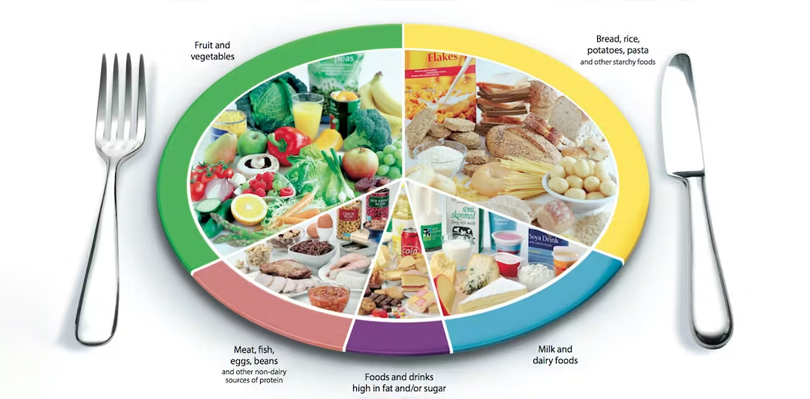Are you tired of feeling sluggish and unsatisfied with your diet? It’s time to embark on a learning journey towards Healthy Eating tips and a healthier lifestyle. Welcome to our blog, where we unveil the six best healthy eating tips that will revolutionize the way you approach food. We’ve curated a list of tried-and-true strategies that will empower you to make positive changes and reclaim your vitality. Picture this: a vibrant plate filled with colorful vegetables, lean proteins, and whole grains that nourish your body and tantalize your taste buds. It’s not just a dream; it can be your reality.
From mastering portion control to discovering the hidden gems of plant-based nutrition, we’re here to guide you every step of the way. Bid farewell to fad diets and restrictive eating patterns, because our tips are all about sustainable habits that fit seamlessly into your life. Get ready to embrace a new chapter of wellness, where delicious and nutritious options become your daily companions. Say goodbye to guilt and hello to a vibrant, energized you. Let’s dive into these life-changing tips and unlock the secrets to a healthier, happier you.
Best Healthy Eating Tips To Change Your Life

Here are the 6 best healthy eating tips that can change your life:
Master Portion Control
It’s not just about what you eat, but also how much you eat. Portion control is key to maintaining a healthy weight and preventing overeating. Learn to listen to your body’s hunger and fullness cues, and use smaller plates and bowls to help control portion sizes.
Fill Your Plate With Color
Aim to include a variety of colorful fruits and vegetables in your meals. These vibrant foods are packed with essential vitamins, minerals, and antioxidants that promote overall health and protect against chronic diseases.
Prioritize Whole Foods
Instead of relying on processed and packaged foods, focus on consuming whole foods that are minimally processed. Opt for fresh fruits and vegetables, lean proteins, whole grains, and healthy fats. These nutrient-dense options provide your body with the necessary fuel and support optimal well-being.
Hydrate, Hydrate, Hydrate
Water is essential for maintaining proper bodily functions and supporting overall health. Make it a habit to drink an adequate amount of water throughout the day. You can also infuse your water with fruits or herbs to add flavor and make hydration more enjoyable.
Plan And Prepare Meals
Set yourself up for success by planning and preparing your meals in advance. This helps you avoid impulsive food choices and ensures that you have nutritious options readily available. Consider batch cooking, meal prepping, or using meal delivery services to make healthy eating more convenient.
Practice Mindful Eating
Slow down and savor each bite. Mindful eating involves paying attention to the taste, texture, and aroma of your food. By being fully present during meals, you can better recognize your body’s hunger and fullness signals, avoid emotional eating, and develop a healthier relationship with food.
By incorporating these six healthy eating tips into your lifestyle, you’ll witness a remarkable transformation in your overall well-being. Say hello to increased energy, improved digestion, and a renewed sense of vitality. Don’t wait another day to start your journey toward a healthier, happier you!
Benefits Of These Healthy Eating Tips
Here are some detailed benefits of healthy eating:
Increased Energy Levels
When you fuel your body with nutritious foods, you provide it with the necessary energy to thrive. A diet rich in whole grains, lean proteins, fruits, and vegetables ensures a steady supply of energy throughout the day, preventing energy crashes and promoting sustained productivity.
Improved Digestive Health
Healthy eating habits support good digestion and prevent common digestive issues such as bloating, constipation, and acid reflux. High-fiber foods like fruits, vegetables, and whole grains aid in proper digestion, promote regular bowel movements, and maintain a healthy gut microbiome.
Enhanced Mental Clarity
Proper nutrition plays a vital role in brain health. Healthy eating supports cognitive function, memory, and concentration. Nutrient-dense foods like fatty fish, nuts, seeds, and leafy greens provide essential nutrients, including omega-3 fatty acids and antioxidants, which contribute to optimal brain health.
Boosted Mood And Emotional Well-Being
What you eat can significantly impact your mood and emotional well-being. A diet rich in fruits, vegetables, whole grains, lean proteins, and healthy fats, such as those found in avocados and nuts, can help regulate neurotransmitters in the brain, promoting positive mental health and reducing the risk of depression and anxiety.
Weight Management
Healthy eating is instrumental in achieving and maintaining a healthy weight. By focusing on nutrient-dense foods that are lower in calories and higher in fiber, you can feel fuller for longer and avoid excessive calorie consumption. Additionally, regular physical activity combined with a balanced diet is crucial for weight management.
Stronger Immune System
A well-balanced diet provides the nutrients necessary for a robust immune system. Nutrient-rich foods, particularly those high in vitamins A, C, and E, zinc, and selenium, help support the body’s defense mechanisms, reduce the risk of infections, and promote faster recovery from illnesses.
Reduced Risk Of Chronic Diseases
Adopting healthy eating habits can significantly reduce the risk of chronic diseases. A diet rich in fruits, vegetables, whole grains, lean proteins, and healthy fats can help lower blood pressure, improve cholesterol levels, regulate blood sugar, and reduce the risk of heart disease, stroke, type 2 diabetes, and certain cancers.
Long-Term Health And Aging
Healthy eating is a cornerstone of longevity and healthy aging. By nourishing your body with nutrient-dense foods and minimizing the consumption of processed and sugary foods, you can maintain optimal health, preserve muscle mass, support bone density, and reduce the risk of age-related diseases.
By embracing healthy eating habits, you unlock a multitude of benefits that positively impact your physical, mental, and emotional well-being. It’s a transformative journey that leads to a happier, healthier, and more vibrant life.
Things You Can Eat To Stay Healthy
Here are some things you can eat to stay healthy, along with extra detail:
Leafy Greens
Leafy greens such as spinach, kale, and Swiss chard are packed with essential vitamins, minerals, and fiber. They are low in calories and high in antioxidants, which help protect against chronic diseases. Incorporate them into salads, stir-fries, smoothies, or sautés for a nutrient boost.
Colorful Fruits
Enjoy a variety of colorful fruits like berries, oranges, apples, and grapes. These fruits are rich in vitamins, minerals, and antioxidants that support overall health and boost the immune system. They also provide natural sweetness and can satisfy your sweet tooth in a healthier way.
Lean Proteins
Incorporate lean proteins into your meals, such as skinless poultry, fish, tofu, beans, and lentils. Protein is essential for building and repairing tissues, supporting muscle growth, and maintaining a healthy immune system. Choose baked, grilled, or steamed options over fried or processed meats.
Whole Grains
Opt for whole grains like quinoa, brown rice, oats, and whole wheat bread instead of refined grains. Whole grains are rich in fiber, vitamins, and minerals, and provide sustained energy throughout the day. They also contribute to better digestion and help control blood sugar levels.
Healthy Fats
Include sources of healthy fats in your diet, such as avocados, nuts, seeds, and olive oil. These fats are essential for brain function, hormone production, and the absorption of fat-soluble vitamins. They also provide satiety and can help reduce the risk of heart disease when consumed in moderation.
Greek Yogurt
Greek yogurt is an excellent source of protein, calcium, and probiotics. It promotes gut health, supports digestion, and helps maintain a healthy weight. Choose plain Greek yogurt and add your own fruits or a drizzle of honey for natural sweetness.
Herbal Teas
Stay hydrated and enjoy the benefits of herbal teas. Options like green tea, chamomile, peppermint, and ginger tea offer various health benefits. Green tea, for example, is rich in antioxidants and may help boost metabolism and support heart health.
Incorporating these nutrient-rich foods into your diet can contribute to overall health and well-being. Remember to prioritize variety, balance, and moderation to ensure a well-rounded and enjoyable eating experience.
What Doctors Say About These Healthy Eating Tips
Doctors strongly endorse these healthy eating tips as they are backed by scientific evidence and promote overall wellness. They emphasize the importance of portion control, balanced meals, and a variety of nutrient-dense foods. Doctors affirm that adopting healthy eating habits can help manage weight, reduce the risk of chronic diseases, improve digestion, boost energy levels, and support mental well-being. They recommend focusing on whole foods, including fruits, vegetables, lean proteins, and whole grains, while limiting processed and sugary foods. Doctors also stress the significance of hydration, mindful eating, and regular physical activity in conjunction with a healthy diet. By following these tips, individuals can enhance their health and quality of life.
FAQs
Are cheat meals allowed in a healthy eating plan?
While cheat meals can be incorporated occasionally, it’s important to maintain balance and moderation. Indulging in occasional treats or favorite foods can help satisfy cravings and promote psychological well-being. However, it’s essential to avoid overindulgence or making cheat meals a regular occurrence, as it can undermine the overall goals of a healthy eating plan.
Is it necessary to follow a specific diet or eating plan for healthy eating?
No, there is no one-size-fits-all approach to healthy eating. It’s more about adopting a balanced and sustainable eating pattern that suits individual preferences and dietary needs. Some people may choose to follow specific diets like Mediterranean, vegetarian, or low-carb, but it’s essential to ensure that the chosen approach meets nutritional requirements and promotes long-term health.
Can healthy eating be affordable?
Yes, healthy eating can be affordable with careful planning and smart choices. Opting for whole foods, such as fresh produce, grains, and legumes, can be cost-effective compared to processed and convenience foods. Buying in bulk, purchasing seasonal produce, and planning meals in advance can also help save money. Additionally, cooking meals at home instead of eating out or ordering takeout can be more budget-friendly and allows for greater control over ingredients.

